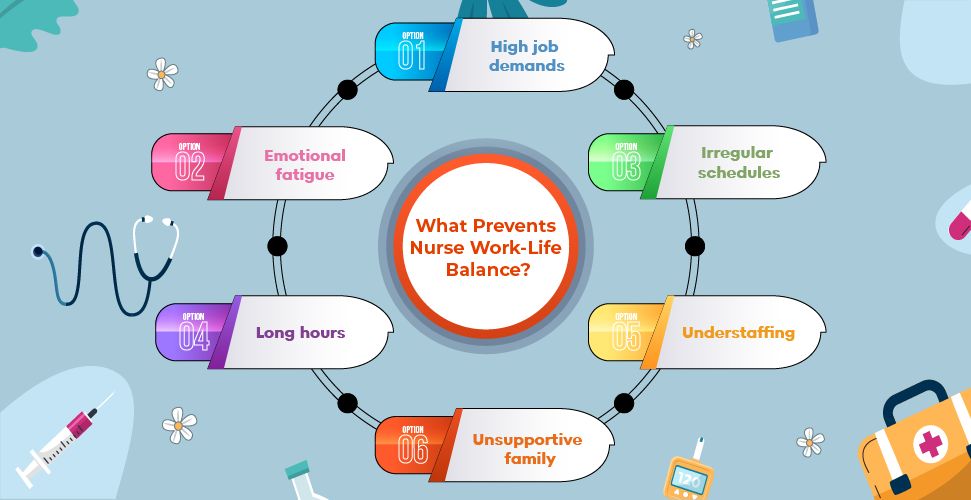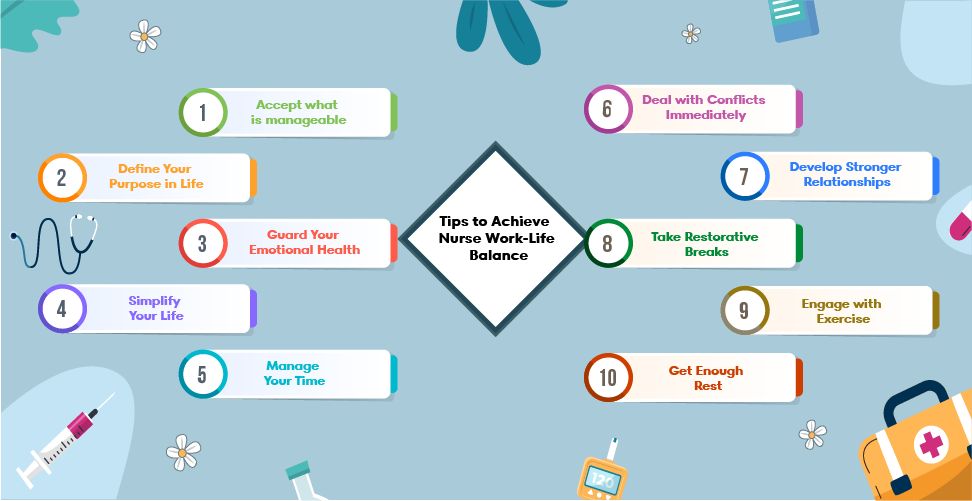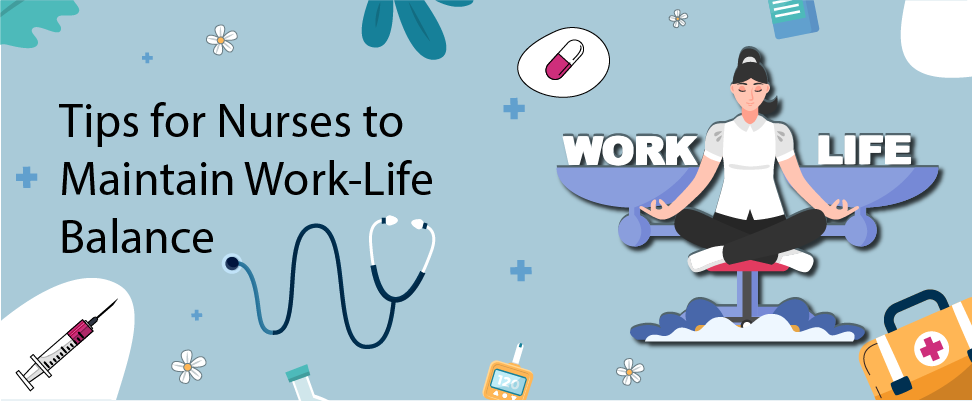Table of Contents
ToggleIntroduction

Don't miss out on your chance to work with the best
Apply for top global job opportunities today!
What Prevents Nurse Work-Life Balance?

High job demands
Nurses frequently manage high-risk situations as they care for multiple patients while simultaneously dealing with intense health issues. Being a nurse requires constant multitasking, critical decision-making, and staying focused even under pressure. Many nurses find it challenging to separate work from personal life as the demands often extend beyond regular hours, making rest and recovery difficult.
Emotional fatigue
Nurses are often exposed to emotionally draining scenarios, such as patient suffering, loss, and family grief. This continuous exposure can lead to emotional burnout. Over time, the emotional weight of the job can make it hard to interact with family or relax after shifts, as the stress stays on, affecting mental health and diminishing emotional resilience.
Irregular schedules
Nurses often work rotating shifts, including nights, weekends, and holidays, disrupting their natural body clock. This inconsistency can make it challenging to maintain a routine, both at work and in personal life. Irregular schedules often lead to sleep deprivation and interfere with family or social commitments, contributing to a sense of imbalance.
Long hours
The nature of the job often requires nurses to work beyond scheduled hours, especially when covering shifts or during emergencies. Extended hours increase physical fatigue and reduce the time available for family, rest, and self-care. Consistently working long hours can lead to burnout, impacting job satisfaction and personal well-being.
Understaffing
With the growing demand for healthcare, many healthcare facilities have staff shortages, forcing nurses to manage heavier patient loads or work additional shifts. This increases both physical and emotional stress, leaving nurses with little personal time or energy for non-work activities. Prolonged understaffing can lead to frustration, severely hampering work-life balance.
Unsupportive family
While nursing is a demanding profession, an unsupportive family environment can further strain a nurse’s ability to balance work with personal life. Without understanding and supportive relationships, nurses may feel isolated and struggle to cope with work demands, reducing their ability to decompress and recharge after shifts.
Tips to Achieve Nurse Work-Life Balance

Accept what is manageable—leave what is not
Irregular shift hours and patient demands are among the things you cannot change. Certain aspects of nursing are beyond control. However, other things, such as requesting manageable workloads from time to time, setting a limit to working overtime, and finding a workplace convenient to commute, can reduce stress.
Define Your Purpose in Life
Nurses often suffer from fatigue from caring too much for others. Some can feel their patient’s pain, sorrow and hopelessness because of being in the profession for a long time. It is important to reflect on what motivates you as a nurse—providing quality patient care, family commitments, or personal growth. A clear sense of purpose can provide direction amid the demands of nursing.
Guard Your Emotional Health
One of the drawbacks of being a nurse or in healthcare, in general, is the deaths and misery professionals see every day. To ensure long-term well-being, it is essential to prioritize mental health. An obvious way is to become emotionally strong to handle difficult patient interactions more effectively. In addition, nurses should find time to engage in mindfulness, pursue a hobby, attend counseling, or find a support network at work. This can greatly help prevent emotional burnout.
Simplify Your Life
Nurses are busy round the clock. Living an organized life can be of great help. For example, simplifying personal routines, using weekly meal plans, giving household responsibilities to family members, and setting achievable goals for oneself can help.
Manage Your Time
Time management is crucial in nursing due to the unpredictable nature of the work. Planning tasks, grouping similar responsibilities, and delegating can help you make the best use of your working hours, reducing the chances of carrying work-related stress home.
- Prioritize your time: Evaluate what truly matters and focus on essential nursing duties and personal activities that provide relaxation, like family time or hobbies, ensuring that these priorities are met daily.
- Have family meetings: If you don’t say, they won’t know. Involve family members in regular discussions about your work-life balance. This allows them to understand the demands of nursing and provides an opportunity to help.
- Set Limits at Work: Communicate with colleagues and supervisors about how much work you can take in one go. If possible, avoid taking on extra shifts or duties that interfere with personal time.
Deal with Conflicts Immediately
Unresolved conflicts at work can add unnecessary stress. Address issues with colleagues or supervisors promptly through productive communication. Clearing up misunderstandings and setting clear expectations improve workplace relationships and morale.
Develop Stronger Relationships
For a nurse, their workplace is a second home. Building strong bonds with colleagues creates a supportive environment and eases the challenges of nursing. Socializing, collaborating on tasks, and offering support reduce stress and foster teamwork, which is invaluable during demanding times.
Take Restorative Breaks
Regular, meaningful breaks are essential for mental clarity. Even short breaks allow nurses to recharge, easing the physical and emotional demands of the job. Structured pauses between tasks make a big difference in sustaining energy levels throughout shifts.
- Time Outs: Brief time-outs can help reset focus during challenging shifts. A few minutes of deep breathing or stretching can make it easier to handle the next task calmly.
- Structured Breaks: Set time apart to get a coffee with your colleagues, listen to music in between, or even take a walk if possible.
- Time Off: Time away from work is vital for avoiding burnout. Take advantage of scheduled days off and use vacation time to disconnect entirely from work-related responsibilities, allowing for full mental recovery.
Engage with Exercise
Many nurses might give up on the idea of getting a gym subscription or a dance session because their profession leaves very little energy for non-work activities. Regular physical activity improves mood, energy levels, and resilience against stress. Incorporate activities like walking, yoga, or gym sessions into your weekly routine, which can help you return to work refreshed and more focused.
Get Enough Rest
Sleep is fundamental for nurses, whose schedules may involve irregular shifts. Prioritize consistent sleep routines to ensure mental alertness and emotional stability. Creating a calm, dark sleep environment supports restful sleep, making it easier to handle the demands of the job.
Must Read: Building a Personal Brand for Career Success
How Can Family Members Make a Nurse's Life Easier?
Families can support nurses in achieving a healthier work-life balance by creating a nurturing and understanding environment. Here are a few ways they can make a nurse’s life easier:
Understanding Schedules
Nursing shifts can be long and irregular. Family members with flexible schedules should recognize late hours and understand the need for rest after shifts. This can help reduce pressure and guilt for nurses who may miss out on family time due to work.
Encouraging Rest and Recovery
Families can support nurses by encouraging adequate rest and ensuring a calm environment at home. For example, a family that recognizes the physical and emotional demands of nursing helps create a quiet space or helps with chores, which can be invaluable for recovery.
Providing Emotional Support
Nursing can be mentally exhausting due to exposure to critical patient situations. Families who listen without judgment, show empathy, and allow nurses to share experiences (without breaching patient confidentiality) can help ease emotional fatigue.
Helping with Household Responsibilities
Sharing household chores or taking on certain tasks like meal prep, cleaning, or buying groceries lightens a nurse’s load at home. This can allow them to recharge without additional stress from daily responsibilities.
Promoting Self-Care
Families can gently encourage activities that promote well-being, like hobbies, relaxation techniques, and physical exercise. Supporting healthy meal choices and mindful practices can benefit a nurse’s overall health.
Celebrating Small Wins
Acknowledging the hard work nurses put into their jobs can help them feel valued and supported. Celebrating their achievements or just expressing gratitude can help keep nurses with a positive attitude.
Hobbies Nurses can Pursue to Maintain Work-Life Balance
Reading
Whether fiction, non-fiction, or self-help books, reading offers a mental escape and can be done anytime, even during breaks. Audiobooks are also a great option when eyes are tired from long shifts.
Journaling
Writing about daily experiences or emotions can be therapeutic and help manage stress. Journaling is flexible; nurses can write a few lines a day, reflecting on thoughts, setting goals, or noting gratitude points.
Meditation and Mindfulness
Practicing meditation or mindful breathing is a great way to de-stress. Apps like Headspace or Calm offer short, guided sessions that can fit into tight schedules.
Walking or Light Exercise
A short walk, particularly outdoors, can improve mood and improve fitness. It’s an easy way to decompress after shifts without the intensity of a workout.
Gardening or Indoor Plant Care
Taking care of plants is calming and requires minimal time investment. Small indoor plants, like succulents, are easy to maintain and bring a bit of nature indoors.
Cooking or Baking
Experimenting with new recipes can be therapeutic and rewarding. For time-pressed schedules, nurses might enjoy trying quick, nutritious meal-prep ideas that support their well-being while keeping it simple.
Artistic Hobbies
Painting, sketching, or adult coloring books offer creative outlets that don’t require prior experience. These activities can help nurses unwind and bring a sense of accomplishment.
Crafting
Knitting, crochet, or simple DIY crafts provide a fun way to create something useful or decorative. These activities can be done while watching TV or listening to music, making them easy to incorporate into relaxing time.
Photography
Taking photos, even with a smartphone, encourages a mindful approach to capturing moments. It’s a flexible hobby that can bring joy and creativity to everyday life.
Conclusion
Ask yourself, “What do I want?” if you regularly face difficult days at work as a nurse. Many nurses will argue that “nursing” and “work-life balance” don’t go together. But the big picture is where you see yourself 5 or 10 years from now—a successful senior nursing professional or a patient struggling with stress-related illnesses. To maintain a work-life balance, create your downtime, set boundaries, take regular breaks, and include your family to support you. Just because you are busy caring for others, your care is not a low priority!
Take control of your career and land your dream job
Sign up with us now and start applying for the best opportunities!

FAQs
Walking, stair climbing, jogging, dancing, bicycling, yoga, tai chi, gardening, weightlifting and swimming are some activities that can help reduce stress.

